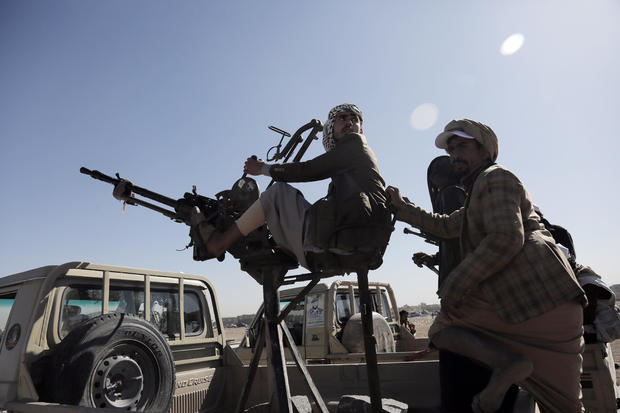
The latest round of missile attacks includes a strike on a U.S. destroyer and a British merchant ship by the Houthis.
Yemen’s Iranian-backed Houthi rebels
On Friday, an attack was carried out on a U.S. warship in the Gulf of Aden, prompting the ship to defend itself by shooting down the incoming missile. Additionally, a British vessel was also targeted in the ongoing aggressive assaults on sea traffic.
The recent strike on the destroyer USS Carney signified a heightened level of aggression in the largest naval conflict witnessed by the U.S. Navy in the Middle East in years.
At approximately 1:30 p.m. on Friday, a ballistic missile designed for attacking ships was launched from Yemen, which is under Houthi control. The U.S. Central Command reported that the USS Carney successfully intercepted the missile and there were no resulting damages or injuries.
Since January 11th, the military has been carrying out airstrikes aimed at weakening the Houthis. This comes after the Houthis had been targeting commercial ships for several weeks.
The United States has carried out multiple rounds of airstrikes, targeting both broader areas such as storage sites and radar capabilities, and also pre-emptive strikes aimed at preventing Houthi missiles from being loaded onto launchers for potential attacks. These preemptive strikes, known as “whack-a-mole” strikes, have become a frequent event.
However, despite the U.S. attacks, the Houthis have not shown signs of being deterred. On Wednesday, the Houthis…launched anti-ship ballistic missiles at the U.S.-owned, flagged and operated commercial ship Maersk Detroit. The U.S. Navy destroyer USS Gravely shot down two missiles and a third fell into the water. There were no indications of damage or injuries in the attack.
Recognizing the assault on Friday as a deliberate strike on an American warship holds significance, according to Brad Bowman, a senior director at the Foundation for the Defense of Democracies.
He stated that they are now openly acknowledging the truth and admitting that they are attempting to harm our troops and cause harm to us.
According to Bowman, the efforts to tone down language and reactions in order to avoid a larger conflict have backfired and only made the Houthis more confident.
The recent attacks by the rebels were part of their ongoing efforts to disrupt ships passing through the Red Sea and nearby waters. These actions have caused disruptions in global trade, while Israel continues its conflict with Hamas in the Gaza Strip.
Getty Images
In November, Houthi insurgents have consistently attacked ships in the Red Sea, claiming retribution for Israel’s attack on Hamas in Gaza. However, they have frequently targeted ships with weak or unclear connections to Israel, putting international trade between Asia, the Middle East and Europe at risk.
The rebels have announced their intention to also target American and British ships since the start of the airstrike campaign.
The highest ranking commander of the U.S. Navy in the Middle East informed the Associated Press on Monday that the Houthi assaults were the most severe since the Tanker War in the 1980s. This resulted in a single-day naval confrontation between Washington and Tehran, and also resulted in the accidental shooting down of an Iranian commercial plane by the U.S. Navy, causing the death of 290 individuals in 1988.
Source: cbsnews.com